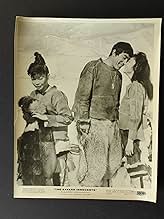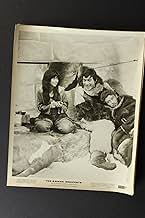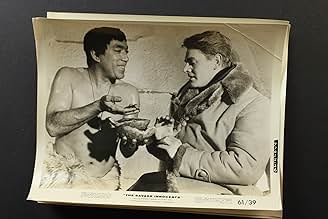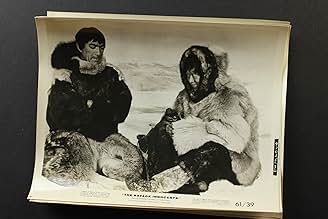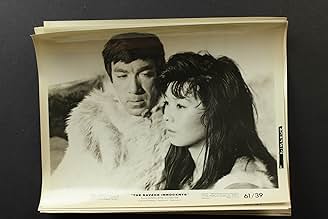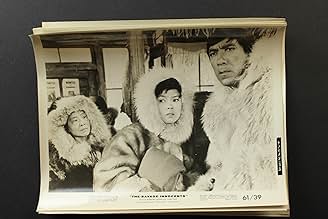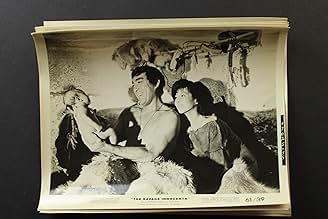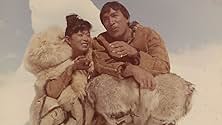Füge eine Handlung in deiner Sprache hinzuAn Inuit who has had little contact with white men goes to a trading post where he accidentally kills a missionary and finds himself being pursued by the police.An Inuit who has had little contact with white men goes to a trading post where he accidentally kills a missionary and finds himself being pursued by the police.An Inuit who has had little contact with white men goes to a trading post where he accidentally kills a missionary and finds himself being pursued by the police.
- Auszeichnungen
- 1 Gewinn & 1 Nominierung insgesamt
- Kiddok
- (as Anthony Chin)
- Missionary
- (Synchronisation)
- (Nicht genannt)
- Asiak
- (Synchronisation)
- (Nicht genannt)
Empfohlene Bewertungen
Not only Ray was the director whose influence was huge on the rock generation ("Rebel with a cause " was the first movie which rocked ,a feat for it was a work which did not include songs)but "savage innocents" inspired Bob Dylan a song which Manfred Mann made a big hit in the sixties.Mighty Quinn indeed.
Anthony Quinn was par excellence the perfect good all-around.a cursory look at his filmography is revealing:from Fellini's "La Strada" to his portrayal of Quasimodo in the French version of "Notre Dame de Paris" (Delannoy) From Barrabas (Fleischer)to an Eskimo.
Like so many Rayesque heroes ,Inuk does not follow the rules :in a way he is akin to the youngsters of "Rebel" ,to Davey Bishop ("Run for cover" ),to Nick ("Knock on any door" ) and of course to the outlaws ("the true story of Jesse James") .But anyway Inuk cannot follow the Whites' rules for ,in his naive innocence,he is incapable of understanding them,which proves they are not universal.Margaret Mead had already showed that what is good and what is bad is not the same wherever you live in the world.
.My favorite scene is the priest trying to make the "savage" understand that he's lived a life of sin: what can a tale of long ago and far away mean for a man whose life is a constant struggle against a hostile nature ? It's the same pragmatism which we find in Luis Bunuel's Oeuvre.
"The savage innocents " is half documentary half fiction;the documentary side shows its age :correct me if I am wrong but "Eskimo" (=raw meat eater) is not a term the Inuit would appreciate nowadays.Besides,they did not live in igloos which were only used during the hunting season.Entirely filmed in studio ,the pictures are magnificent though,a real symphony in white.The white color dominates everything (tinged with blue)except for this extremely moving scene when it turns black when the old woman is left in the snow to die (it will remind the young cine buffs of Imamura's "Narayama Bushiko" (1983)).
"The savage innocents " sets the nature and its quietness -although it's a cruel mistress;when you fight a bear,it's you or him-against the "civilization" here represented by alcohol,pop music ,money and the Law.Ray had already been an ecologist ahead of his time in "Wind across the everglades" These two works are like "twin movies" and should be seen one after the other.
After all "King of Kings" was also perhaps a Ray movie:Jesus himself was not born to follow the rules.
Filmed in the arctic regions of Canada and Greenland, and presenting us with a faithful and loving documentation of Inuit traditions and life, Ray on one hand captures the sheer monumental beauty of the harsh arctic wastelands with a kind of Kubrickian grandeur, while on the other reserving for his characters the utmost sympathy and affection. The stark realism of the uninviting climate contrasted with the good-natured predisposition and unpretentious simplicity of the people living in it. Realism meeting halfways with humanism in a movie that is as humorous and touching as it is cerebral, part survival grit and part mythological folklore.
And then white man comes into Inuk's world. With his rifles, his loud rock'n'roll music, his missionaries preaching their god, his weird customs and laws. That doesn't mean that what precedes Inuk's encounter with the white men of a trading post and the preacher living there is an idyllic utopia - Inuk is ready to club another man to death for taking the woman he planned to make his wife. Still it would be easy to sneer sarcastically from the comfort of our modern homes at the primitive customs of Inuit. "In the age of the atom bomb", says the voice-over narrator, "these people still hunt with bow and arrow". Indeed they do; they also leave their elders alone to die in the snow when they become too old to contribute to the household anymore and they leave their firstborn babies to die unless they are male, so they can take care of them when they in turn grow old. But such is the nature of their lives and the environment they live in.
Anthony Quinn's performance as Inuk is fantastic, equal measure good-natured forwardness and unreserved honesty. A man as likely to offer you his wife as he is to bash your brains in for refusing her. Peter O'Toole (two years before LAWRENCE OF ARABIA) in the role of the officer sent to arrest Inuk for the murder of the preacher doesn't match Quinn but he's a nice addition to the cast. The most dramatically poignant moments in the film come from their interactions as Inuk struggles to comprehend the crime he is accused of. "But my Fathers' laws have not been broken" he says when he is informed he broke the law and will have to be taken back for trial. "When you come to a strange land, bring your wives, not your laws" is what Inuk's wife tells the officer.
A great, great movie I can't recommend enough to fans of tales of survival in stark environments, different cultures and their folklore. NANOOK OF THE NORTH and DERSU UZALA are advised to look out for it.
It's a MYTH that the elderly were left on ice flows or in a snow drift. In the Atomic age even us savages knew what a gun was and golly gee we even saw those metal birds a flyin over head. Ugh.
Someone wrote "far northern natives that lived almost exclusively on the arctic ice". How stupid. Do you suppose we all lived in kayaks and Umiaks during the spring thaw and summer months? We hunted on the ice sometimes when we weren't hunting caribou deer and moose we are MEAT EATERS. No hunter would kill a dog to warm someones' hands', he would have never let the trooper get that bad to start with. A live dog would have warmed a person as well as pull you to a place you could get help. Or we would have eaten the animal should the need arise. Hunt a polar bear alone, ridiculous!
And giving the dead seal a drink of fresh water. Unbelievable! Yes we would surely have given thanks to the animal spirits. Sea mammals don't drink fresh water, they get all the liquid they need from the foods they eat. Look it up. The clothes were authentic for sure but from different cultures of Inuit.
All in all the reviews praising this movie for "culturally authentic" are from people who have no idea what they are talking about and believe all the things that they see in movies. It's a movie not a documentary. Par for the times they didn't hire real Inuit or even American Indians to play the parts Anthony Quinn and Japanese Chinese played as Inuit's is funny. Too that nobody would bother to hire on a real Inuit as a consultant was standard for the times.
Entertaining maybe, insulting to THE MEN absolutely.
The picture was shot in Ottawa 1959 , March . Ray traveled to the Bay of Hudson and Churchill (Manitoba) for exterior location . Besides , for interior scenes were filmed at Pinewood Studios (London)and Cinecitta (Rome) , during thirteen weeks in a studio work including quite a few transparency . Spectacular and colorful cinematography in Technirama 70 by Aldo Tonti and Henessy with marvelous landscapes from Arctic where we watch all type of animals : White bears , seals , walrus , oxes , whales , reindeer , Arctic fox.. Sensitive and evocative music by Angelo Francesco Lavagnino . Anthony Quinn gives an exceptional acting along with the newcomer and remarkable Yoko Tani . The veteran actress from silent cinema , Anna My Wong , plays splendidly as grandmother . In a secondary role shows up Peter O'Toole (though dubbed) , he plays a patrolman who pursues to Anthony Quinn accused for killing accidentally a missionary . However , Peter O'Toole demanded that his name be removed from the film's opening and closing credits because his voice was dubbed by another actor . The great and stylish filmmaker Nicholas Ray working at the peak of his powers . Well worth watching for the brooding script and wonderful location . Rating : Better than average.
It is NOT a documentary. There is a story here, an exciting story, at times edge of your seat--or maybe I should say, a number of stories, all interesting, all moving. The photography, sound, scenery, acting, all were excellent.
What struck me most, out of a long list, was the way the point of view of these Inuit people was gotten across. For instance, the missionary butts his head into the igloo and says, "God be with you." Quinn looks puzzled, glances at his wife and says, "No, there's nobody here but us." When the missionary goes on preaching at them, trying to convert them to the "true" faith, Quinn whispers to his wife, "I think he needs to laugh with a woman. Make yourself beautiful." In other words, the guy needs to get laid. The Freudian insight implied by these simple remarks is staggering. And this is only a small sample.
Perhaps the fate of this movie had a lot to do with the advertising. The picture at the top of this page suggests that this is a "savage" movie. It isn't. The title itself is unfortunate.
Yes, when oh when will we get to see this movie again? When will the savage and not-so-innocent moguls deign to put this beautiful film onto DVD?
Wusstest du schon
- WissenswertesIt was seeing this film, as an upcoming singer/songwriter, that inspired the young Bob Dylan to write the song "The Mighty Quinn (Quinn the Eskimo)."
- PatzerAfter giving the bear the baited food, Inuk initially chases it empty handed, then appears with a spear.
- Zitate
First Trooper: Inuk. listen. No judge in the world will understand you offering another man your wife.
Inuk: But it is our custom, we must be polite. White men don't borrow other men's wives?
First Trooper: Never mind that. You don't lend your wife as if she were a sled.
Inuk: Oh ho ho, someone would rather lend his wife than his sled. You lend your sled, it comes back cracked. You lend your knife, it comes back dull. You lend your dogs, they come back tired and crawling. But if you love your wife, no matter how often you lend her, she always comes back like new.
Inuk: [embraces Asiak]
Inuk: Man, man, you don't understand?
Inuk: I understand. But the other men live by the book, and there you are a murderer
Inuk: But we must make them understand, otherwise Papik, Asiak and me cannot go into other men's igloos, that is OUR law.
Inuk: We change the book, huh?
[to Asiak as he prepares to go out]
Inuk: You bring the food
[Exits]
First Trooper: [to Asiak] They'll never understand.
Asiak: [as she exits the doorway of igloo] When you come to a strange land, you should bring your wives, and not your laws.
- VerbindungenReferenced in Nick's Film - Lightning Over Water (1980)
Top-Auswahl
- How long is The Savage Innocents?Powered by Alexa
Details
- Laufzeit1 Stunde 50 Minuten
- Seitenverhältnis
- 2.20 : 1
Zu dieser Seite beitragen


